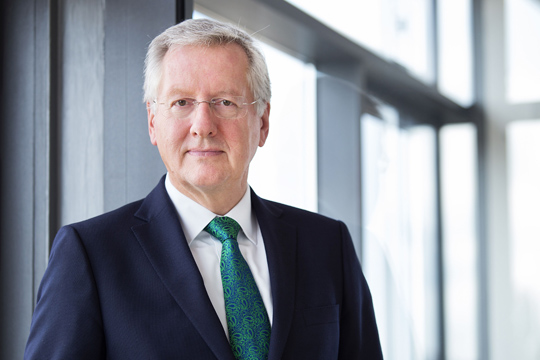Tenure Track Perspectives
Freiburg, Sep 16, 2020
Ten out of eleven faculties have at least one tenure-track position. The University of Freiburg has relied on this model from an early stage. The tenure-track professorship promises young academics reliable career prospects right from the start of their careers. Is it a successful model? Does it appeal to the academic community, and can it prove effective in the international race for the best minds? These questions will be the focus of the conference “The Tenure Track Professorship – A Catalyst for the German Academic System,” which the University of Freiburg is organizing in cooperation with partners. Rimma Gerenstein asked Rector Prof. Dr. Hans-Jochen Schiewer what he expects from the two-day convention
 Many female academics leave science after their doctorate. The tenure-track professorship could prevent this by offering outstanding female researchers a reliable career perspective at an early stage. Photo: András Wekler
Many female academics leave science after their doctorate. The tenure-track professorship could prevent this by offering outstanding female researchers a reliable career perspective at an early stage. Photo: András Wekler
Mr. Schiewer, what is the reason for the nationwide conference?
Hans-Jochen Schiewer: We want to reach an interim conclusion, you might say. It has been four years now since the federal and state governments advertised 1,000 tenure-track positions throughout Germany. The University of Freiburg was able to recruit 19 of these professorships. The first cohort is almost filled nationwide so we're talking about roughly 500 positions. At the conference, we want to address the question of how tenure track can be successfully anchored in the German academic system. How well does the program work? How do the appointed candidates feel about it? What are the benefits, the drawbacks and which issues have arisen? The fact that the Federal Ministry of Education and Research is participating in the conference and supporting us financially indicates that the time is ripe for this discussion.
The University of Freiburg had already opted for the tenure-track professorship before the federal-state program. Why?
This model already played a role in our first application within the Excellence Initiative. We recognized that the tenure-track professorship is an important, new instrument for promoting young researchers. It drives innovation for the University’s further advancement and thus a building block for the future.
How does it drive innovation?
With the tenure track, faculties and University leadership can launch new research profiles much earlier than with a regular appointment. In concrete terms, it means we can change course where necessary and we can switch to new approaches, theories and methods. When extremely promising young researchers come to us with their own research group, the tenure track offers them a perspective that leads up to a professorship even at an early stage in their career. This gives us the opportunity to keep women in science in particular. We are still losing many outstanding female researchers after they have completed their doctorate. Of the 17 positions we have currently filled in Freiburg, seven are held by women. It is not quite balanced, but it shows a much better ratio than in the appointments to W3 professorships. I want to continue to promote this encouraging trend. Hans-Jochen Schiewer emphasizes that the tenure track is a program for young researchers without a habilitation: “It is not a model for selecting the best across all career stages.” Photo: Silvia Wolf
Hans-Jochen Schiewer emphasizes that the tenure track is a program for young researchers without a habilitation: “It is not a model for selecting the best across all career stages.” Photo: Silvia Wolf
Has the tenure track also proven itself in terms of international competition?
Definitely. A large part of the tenure-track professorships to date have been filled by scientists whom we have recruited from research institutions abroad. Often these are Germans for whom it is particularly attractive to work here. For example, we recently appointed an outstanding scientist from Princeton, and she also brought her own research group with her.
Is the model equally attractive for all disciplines?
There are differences in the disciplinary cultures. In our Clusters of Excellence in the field of life sciences or material sciences, we see that the tenure-track professorship is used very specifically to recruit the right people. On the other hand, there are also areas where the model is viewed with a certain reluctance. In the humanities, for example, there is a concern that a person’s potential at such an early stage in his or her career cannot yet be properly assessed. In those areas, it is common practice to wait until the habilitation phase. I have also observed something else: not all subjects have understood that the tenure track is about a specific cohort. It is not a model for the best selection across all career stages, but explicitly for young researchers who have not yet habilitated. I think we still have to work on the culture within the University here.
Could further federal and state funding ensure that the tenure-track professorship becomes established as a career model for young researchers?
It is always helpful to work with incentives. We have now set these incentives: With the support of the German federal and state program, we can provide each position with approximately 825,000 euros over a period of eight years. This makes the tenure track quite attractive for faculties, and we must also make it clear to them that they lose nothing by doing so. Anyone who gets a tenure-track position does not have to give resources to the central budget. Ten of our eleven faculties have tenure-track professorships. We have had very good experiences with it. Now we have to anchor it even more firmly in the consciousness of the academic community.
Digital Conference
The Universities of Freiburg and Jena are organizing the conference, which will take place in Berlin on September 29 and 30, 2020, together with the Universities of Mainz, Frankfurt and Hannover. They are supported by the German U15 university association and the Federal Ministry of Education and Research. The conference will take place mainly in digital form. The lectures and panel discussions will be livestreamed online. The event is geared towards all interested parties and is free of charge. Registration is possible until September 20. If you have any questions, please contact the Strategy Department at the University of Freiburg.
Information and registration

